#it would make for an interesting story if bryke would just admit he's a bad avatar and steered into it
Explore tagged Tumblr posts
Text
Fic Snippet!
“Are you out of your mind?” Zuko rushed across the courtyard and bore down on Aang with an intense, almost palpable fury. “Do you know how badly you could’ve hurt her?”
“I was just…I didn’t mean to-“ Aang stammered.
“Fire is not a toy!” Zuko bellowed at him. He turned to Katara, examining her for injuries. “Are you okay?”
“I’m alright,” she assured him, her voice shaking. “I’m fine.” She was trembling visibly, and there were singe marks on her clothes, but she otherwise seemed unharmed. Zuko turned back to Aang, how was looking down at his feet in shame.
“What were you thinking?” Zuko demanded.
“I don’t know,” Aang mumbled, kicking at the ground. “I was…mad.”
“About what?” Zuko was absolutely bewildered. “What could Katara possibly have done that you thought it was a good idea to do that?”
“Nothing,” Aang admitted sullenly. He didn’t say anything after that. Zuko glowered at him, took a few deep breaths to quell his own anger.
“You’re going to clean this mess up,” he said gesturing to the torn up stones, dirt and cooling lava. “Then you’re going to do 100 fire squats. Then you’re going to work on your forms for an hour. And I don’t want to see so much as a curl of smoke out of you. You’re not responsible enough for fire. Understood?”
“What? That’s not-“ Aang’s protests died on his lips when he saw Zuko’s expression. He huffed, kicked at stone, and finally nodded.
“Get started,” Zuko ordered through clenched teeth. He turned back to Katara, who was watching the exchange. She was still shaking a bit. Zuko draped his arm protectively around her back and guided her away. He glanced back once more at Aang, and almost rolled his eyes when he saw the younger boy still moping at the ground. It was hard sometimes to reconcile the awesome might and eminence of the Avatar with the reality of Aang, the child.
“I’ll be back,” he warned Aang. “Have this mess cleaned up. And don’t even think about asking Toph to help.”
I know canonically, the Lava Fissure Incident takes place while Zuko and Sokka are rescuing Hakoda, but I wanted to have Zuko see and react to it. Personally, I think it was another accidentally accurate depiction of how unready Aang is to be the Avatar. And it is also another incident that the narrative decides not to call Aang out for, so the chances of him growing from it are...well, we all know how things turned out in LoK.
#atla#anti aang#anti kataang#zutara#dadko is dadding#aang is a trash avatar#it would make for an interesting story if bryke would just admit he's a bad avatar and steered into it#aang by the end of atla could either have a growth arc#or a villain origin#i think villain origin is the more interesteing choice#especially with how they wrote aang in the post series canon#but growth would still make a good story
273 notes
·
View notes
Text
in which I get progressively angrier at the various tropes of atla fandom misogyny
tbh I think it would serve all of us to have a larger conversation about the specific ways misogyny manifests in this fandom, because I’ve seen a lot of people who characterize themselves as feminists, many of whom are women themselves, discuss the female characters of atla/lok in misogynistic ways, and people don’t talk about it enough.
disclaimer before I start: I’m not a woman, I’m an afab nonbinary person who is semi-closeted and thus often read as a woman. I’m speaking to things that I’ve seen that have made me uncomfy, but if any women (esp women existing along other axes of oppression, e.g. trans women, women of color, disabled women, etc) want to add onto this post, please do!
“This female character is a total badass but I’m not even a little bit interested in exploring her as a human being.”
I’ve seen a lot of people say of various female characters in atla/lok, “I love her! She’s such a badass!” now, this statement on its own isn’t misogynistic, but it represents a pretty pervasive form of misogyny that I’ve seen leveled in large part toward the canon female love interests of one or both of the members of a popular gay ship (*cough* zukka *cough*) I’m going to use Suki as an example of this because I see it with her most often, but it can honestly be applied to nearly every female character in atla/lok. Basically, people will say that they stan Suki, but when it comes time to engage with her as an actual character, they refuse to do it. I’ve seen meta after meta about Zuko’s redemption arc, but I so rarely see people engage with Suki on any level beyond “look at this cool fight scene!” and yeah, I love a cool Suki fight scene as much as anybody else, but I’m also interested in meta and headcanons and fics about who she is as a person, when she isn’t an accessory to Sokka’s development or doing something cool. of course, the material for this kind of engagement with Suki is scant considering she doesn’t have a canon backstory (yet) (don’t let me down Faith Erin Hicks counting on you girl) but with the way I’ve seen people in this fandom expand upon canon to flesh out male characters, I know y’all have it in you to do more with Suki, and with all the female characters, than you currently do. frankly, the most engagement I’ve seen with Suki in mainstream fandom is justifying either zukki (which again, is characterizing her in relation to male characters, one of whom she barely interacts with in canon) or one of the Suki wlw pairings. which brings me to--
“I conveniently ship this female character whose canon love interest is one of the members of my favorite non-canon ship with another female character! gay rights!”
now, I will admit, two of my favorite atla ships are yueki and mailee, and so I totally understand being interested in these characters’ dynamics, even if, as is the case with yueki, they’ve never interacted canonically. however, it becomes a problem for me when these ships are always in the background of a zukka fic. at some point, it becomes obvious that you like this ship because it gets either Zuko or Sokka’s female love interests out of the way, not because you actually think the characters would mesh well together. It’s bad form to dislike a female character because she gets in the way of your gay ship, so instead, you find another girl to pair her off with and call it a day. to be clear, I’m not saying that everybody who ships either mailee or yueki (or tysuki or maisuki or yumai or whatever other wlw rarepair involving Zuko or Sokka’s canon love interests) is nefariously trying to sideline a female character while acting publicly as if she’s is one of their faves--far from it--but it is noteworthy to me how difficult it is to find content that centers wlw ships, while it’s incredibly easy to find content that centers zukka in which mailee and/or yueki plays a background role.
also, notice how little traction wlw Katara ships gain in this fandom. when’s the last time you saw yuetara on your dash? there’s no reason for wlw Katara ships to gain traction in a fandom that is so focused on Zuko and Sokka getting together, bc she doesn’t present an immediate obstacle to that goal (at least, not an obstacle that can be overcome by pairing her up with a woman). if you are primarily interested in Zuko and Sokka’s relationship, and your queer readings of other female characters are motivated by a desire to get them out of the way for zukka, then Katara’s canon m/f relationship isn’t a threat to you, and thus, there’s no reason to read her as potentially queer. Or even, really, to think about her at all.
“Katara’s here but she’s not actually going to do anything, because deep down, I’m not interested in her as a person.”
the show has an enormous amount of textual evidence to support the claim that Sokka and Katara are integral parts of each other’s lives. so, she typically makes some kind of appearance in zukka content. sometimes, her presence in the story is as an actual character with layers and nuance, someone whom Sokka cares about and who cares about Sokka in return, but also has her own life and goals outside of her brother (or other male characters, for that matter.) sometimes, however, she’s just there because halfway through writing the author remembered that Sokka actually has a sister who’s a huge part of the show they’re writing fanfiction for, and then they proceed to show her having a meetcute with Aang or helping Sokka through an emotional problem, without expressing wants or desires outside of those characters. I’m honestly really surprised that I haven’t seen more people calling out the fact that so much of Katara’s personality in fanon revolves around her connections to men? she’s Aang’s girlfriend, she’s Sokka’s sister, she’s Zuko’s bestie. never mind that in canon she spends an enormous amount of time fighting against (anachronistic, Westernized) sexism to establish herself as a person in her own right, outside of these connections. and that in canon she has such interesting complex relationships with other female characters (e.g. Toph, Kanna, Hama, Korra if you want to write lok content) or that there are a plethora of characters with whom she could have interesting relationships with in fanon (Mai, Suki, Ty Lee, Yue, Smellerbee, and if you want to write lok content, Kya II, Lin, Asami, Senna, etc). to me, the lack of fandom material exploring Katara’s relationships with other women or with herself speak to a profound indifference to Katara as a character. I’m not saying you have to like Katara or include her in everything you write, but I am asking you to consider why you don’t find her interesting outside of her relationships with men.
“I hate Katara because she talks about her mother dying too often.”
this is something I’ve seen addressed by people far more qualified than I to address it, but I want to mention it here in part because when I asked people which fandom tropes they wanted me to talk about, this came up often, but also because I find it really disgusting that this is a thing that needs to be addressed at all. Y’all see a little girl who watched her mother be killed by the forces of an imperialist nation and say that she talks about it too much??? That is a formational, foundational event in a child’s life. Of course she’s going to talk about it. I’ve seen people say that she doesn’t talk about it that often, or that she only talks about it to connect with other victims of fn imperialism e.g. Jet and Haru, but frankly, she could speak about it every episode for no plot-significant reason whatsoever and I would still be angry to see people say she talks about it too much. And before you even bring up the Sokka comparison, people deal with grief in different ways. Sokka repressed a lot of his grief/channeled it into being the “man” of his village because he knew that they would come for Katara next if he gave them the opportunity. he probably would talk about his mother more if a) he didn’t feel massive guilt at not being able to remember what she looked like, and b) he was allowed to be a child processing the loss of his mother instead of having to become a tiny adult when Hakoda had to leave to help fight the fn. And this gets into an intersection with fandom racism, in that white fans (esp white American fans) are incapable of relating to the structural trauma that both Sokka and Katara experience and thus can’t see the ways in which structural trauma colors every single aspect of both of their characters, leading them to flatten nuance and to have some really bad takes. And you know what, speaking of bad fandom takes--
“Shitting on Mai because she gets in the way of my favorite Zuko ship is actually totally okay because she’s ~abusive~”
y’all WHAT.
ok listen, I get not liking maiko. I didn’t like it when I first got into fandom, and later I realized that while bryke cannot write romance to save their lives, fans who like maiko sure can, so I changed my tune. but if you still don’t like it, that’s fine. no skin off my back.
what IS skin off my back is taking instances in which Mai had justified anger toward Zuko, and turning it into “Mai abused Zuko.” do you not realize how ridiculous you sound? this is another thing where I get so angry about it that I don’t know how useful my analysis is actually going to be, but I’ll do my best. numerous people have noted how analysis of Mai and Zuko’s breakup in “The Beach” or Mai being justifiably angry with him at Boiling Rock or her asking for FUCKING FRUIT in “Nightmares and Daydreams” that says that all of these events were her trying to gain control over him is....ahhh...lacking in reading comprehension, but I’d like to go a step further and talk about why y’all are so intent on taking down a girl who doesn’t show emotion in normative ways. obviously, there’s a “Zuko can do no wrong” aspect to Mai criticism (which is super weird considering how his whole arc is about how he can do lots of wrong and he has to atone for the wrong that he’s done--but that’s a separate post.) But I also see slandering Mai for not expressing her emotions normatively and not putting up with Zuko’s shit and slandering Katara for “talking about her mother too often” as two sides of the same coin. In both cases, a female character expresses emotions that make you, the viewer, uncomfortable, and so instead of attempting to understand where those emotions may have come from and why they might be manifesting the way they are, y’all just throw the whole character away. this is another instance of people in the fandom being fundamentally disinterested in engaging with the female characters of atla in a real way, except instead of shallowly “stanning” Mai, y’all hate her. so we get to this point where female characters are flattened into one of two things: perfect queens who can do no wrong, or bitches. and that’s not who they are. that’s not who anyone is. but while we as a fandom are pretty good at understanding b1 Zuko’s actions as layered and multifaceted even though he’s essentially an asshole then, few are willing to lend the same grace to any female character, least of all Mai.
and what’s funny is sometimes this trope will intersect with “I conveniently ship this female character whose canon love interest is one of the members of my favorite non-canon ship with another female character! gay rights!”, so you’ll have someone actively calling Mai toxic/problematic/abusive, and at the same time ship her with Ty Lee? make it make sense! but then again, maybe that’s happening because y’all are fundamentally disinterested in Ty Lee as a character too.
“I love Ty Lee so much that I’m going to treat her like an infantilized hypersexual airhead!”
there are so many things happening in y’alls characterization of Ty Lee that I struggled to synthesize it into one quippy section header. on one hand, you have the hypersexualization, and on the other hand, you have the infantilization, which just makes the hypersexualization that much worse.
(of course, sexualizing or hypersexualizing ANY atla character is really not the move, considering that these are child characters in a children’s show, but then again, that’s a separate post.)
now, I understand how, from a very, very surface reading of the text, you could come to the conclusion that Ty Lee is an uncomplicated bimbo. if you grew up on Western media the way I did, you’ll know that Ty Lee has a lot of the character traits we associate with bimbos: the form-fitting pink crop top, the general conventional attractiveness, the ditzy dialogue. but if you think about it for more than three seconds, you’ll understand that Ty Lee has spent her whole life walking a tightrope, trying to please Azula and the rest of the royal family while also staying true to herself. Ty Lee and Azula’s relationship is a really complex and interesting topic that I don’t really have time to explore at the moment given how long this post is, but I’d argue that Ty Lee’s constant, vocal adulation is at least partially a product of learning to survive at court at an early age. Like Mai, she has been forced to regulate her emotions as a member of fn nobility, but unlike Mai, she also has six sisters who look exactly like her, so she has a motivation to be more peppy and more affectionate to stand out.
fandom does not do the work to understand Ty Lee. as is a theme with this post, fandom is actively disinterested in investigating female characters beyond a very surface level reading of them. Thus, fandom takes Ty Lee’s surface level qualities--her love of the color pink, her revealing standard outfit, and the fact that once she found a boy attractive and also once a lot of boys found her attractive--and they stretch this into “Ty Lee is basically Karen Smith from Mean Girls.” thus, Ty Lee is painted as a bimbo, or more specifically, as not smart, uncritically adoring of Azula (did y’all forget all the non-zukka bits of Boiling Rock?), and attractive to the point of hypersexualization. I saw somebody make a post that was like “I wish mailee was more popular but I’m also glad it isn’t because otherwise people would write it as Mai having to put up with her dumb gf” and honestly I have to agree!! this is one instance in which I’m glad that fandom doesn’t discuss one of my favorite characters that often because I hate the fanon interpretation of Ty Lee, I think it’s rooted in misogyny (particularly misogyny against East Asian women, which often takes the form of fetishizing them and viewing them only through a Western white male gaze)
(side note: here at army-of-mai-lovers, we stan bimbos. bimbos are fucking awesome. I personally don’t read Ty Lee as a bimbo, but if that’s you, that’s fucking awesome. keep doing what you’re doing, queen <3 or king or monarch, it’s 2021, anyone can be a bimbo, bitches <3)
“Toph can and will destroy everyone here with her bare hands because she’s a meathead who likes to murder people and that’s it!”
Toph is, and always has been, one of my favorite ATLA characters. My very first fic in fandom was about her, and she appears prominently in a lot of my other work as well. One thing that I am always struck by with Toph is how big a heart she has. She’s independent, yes, snarky, yes, but she cares about people--even the family that forced her to make herself smaller because they didn’t believe that their blind daughter could be powerful and strong. Her storyline is powerful and emotionally resonant, her bending is cool precisely because it’s based in a “wait and listen” approach instead of just smashing things indiscriminately, she’s great disabled rep, and overall one of the best characters in the show.
And in fandom, she gets flattened into “snarky murder child.”
So where does this come from? Well, as we all know, Toph was originally conceived of as a male character, and retained a lot of androgyny (or as the kids call it, Gender) when she was rewritten as a female character. There are a lot of cultural ideas about androgynous/butch women being violent, and people in fandom seem to connect that larger cultural narrative with some of Toph’s more violent moments in the show to create the meathead murder child trope, erasing her canon emotionality, softness, heart, and femininity in the process.
This is not to say that you shouldn’t write or characterize Toph as being violent or snarky at all ever, because yeah, Toph definitely did do Earth Rumbles a lot before joining the gaang, and yeah, Toph is definitely a sarcastic person who makes fun of her friends a lot. What I am saying is that people take these traits, sans the emotional logic, marry them to their conception of androgynous/butch women as violent/unemotional/uncaring, and thus create a caricature of Toph that is not at all up to snuff. When I see Toph as a side character in a fic (because yeah, Toph never gets to be a main character, because why would a fandom obsessed with one male character in particular ever make Toph a protagonist in her own right?) she’s making fun of people, killing people, pranking people, etc, etc. She’s never talking to people about her emotions, or palling around with her found family, or showing that she cares about her friends. Everything about her relationship with her parents, her disability, her relationship to Gender, and her love of her friends is shoved aside to focus on a version of Toph that is mean and uncaring because people have gotten it into their heads that androgynous/butch women are mean and uncaring.
again, we see a female character who does not emote normatively or in a way that makes you, the viewer, comfortable, and so you warp her character until she’s completely unrecognizable and flat. and for what?
Azula
no, I didn’t come up with a snappy name for this section, mainly because fanon interpretations of Azula and my own feelings toward the character are...complicated. I know there were some people who wanted me to write about Azula and the intersection of misogyny and ableism in fanon interpretations of her character, but I don’t think I can deliver on that because I personally am in a period of transition with how I see Azula. that is to say, while I still like her and believe that she can be redeemed, there is a lot of merit to disliking her. the whole point of this post is that the female characters of ATLA are complex people whom the fandom flattens into stereotypes that don’t hold up to scrutiny, or dislike for reasons that don’t make sense. Azula, however, is a different case. the rise of Azula defenders and Azula stans has led to this sentiment that Azula is a 14 y/o abuse victim who shouldn’t be held accountable for her actions. it seems to me that people are reacting to a long, horrible legacy of male ATLA fans armchair diagnosing Azula with various personality disorders (and suggesting that people with those personality disorders are inherently monstrous and unlovable which ahhhh....yikes) and then saying that those personality disorders make her unlovable, which is quite obviously bad. and hey, I get loving a character that everyone else hates and maybe getting so swept up in that love that you forget that your fave is complicated and has made some unsavory choices. it sucks that fanon takes these well-written, complex villains/antiheroes and turns them into monsters with no critical thought whatsoever. but the attitude among Azula stans that her redemption shouldn’t be hard, that her being a child excuses all of the bad things that she’s done, that she is owed redemption....all of that rubs me the wrong way. I might make another post about this in the future that discusses this in more depth, but as it stands now: while I understand that there is a legacy of misogynistic, ableist, unnuanced takes on Azula, the backlash to that does not take into account the people she hurt or the fact that in ATLA she does not make the choice to pursue redemption. and yes, Zuko had help in making that choice that Azula didn’t, and yes, Azula is a victim of abuse, but in a show about children who have gone through untold horrors and still work to better the lives of the people around them, that is not enough for me to uncritically stan her.
Conclusion
misogyny in this fandom runs rampant. while there are some tropes of fandom misogyny that are well-documented and have been debunked numerous times, there are other, subtler forms of misogyny that as far as I know have gone completely unchecked.
what I find so interesting about misogyny in atla fandom is that it’s clear that it’s perpetrated by people who are aware of fandom misogyny who are actively trying not to be misogynistic. when I first joined atla fandom last summer, memes about how zukka fandom was better than every other fandom because they didn’t hate the female characters who got in the way of their gay ship were extremely prevalent, and there was this sense that *this* fandom was going to model respectful, fun, feminist online fandom. not all of the topes I’ve outlined are exclusive to or even largely utilized in zukka fandom, but a lot of them are. I’ve been in and out of fandom since I was eleven years old, and most of the fandom spaces I’ve been in have been majority-female, and all of them have been incredibly misogynistic. and I always want to know why. why, in these communities created in large part by women, in large part for women, does misogyny run wild? what I realize now is that there’s never going to be a one-size fits all answer to that question. what’s true for 1D fandom on Wattpad in 2012 is absolutely not true for atla fandom on tumblr in 2021. the answers that I’ve cobbled together for previous fandoms don’t work here.
so, why is atla fandom like this? why did the dream of a feminist fandom almost entirely focused on the romantic relationship between two male characters fall apart? honestly, I think the notion that zukka fandom ever was this way was horrifically ignorant to begin with. from my very first moment in the fandom, I was seeing racism, widespread sexualization of minors, and yes, misogyny. these aspects of the fandom weren’t talked about as much as the crocverse or other, much more fun aspects. further, atla (specifically zukka) fandom misogyny often doesn’t look like the fandom misogyny we’ve become familiar with from like, Sherlock fandom or what have you. for the most part, people don’t actively hate Suki, they just “stan” without actually caring about her. they hate Mai because they believe in treating male victims of abuse equally. they’re not characterizing Toph poorly, they’re writing her as a “strong woman.” in short, people are misogynistic, and then invoke a shallow, incomplete interpretation of feminist theory to shield themselves from accusations of misogyny. it’s not unlike the way some people will invoke a shallow, incomplete interpretation of critical race theory to shield themselves from accusations of racism, or how they’ll talk about “freedom of speech” and “the suppression of women’s sexuality” to justify sexualizing minors. the performance of feminism and antiracism is what’s important, not the actual practice.
if you’ve made it this far, first off, hi, thanks so much for reading, I know this was a lot. second, I would seriously encourage you to be aware of these fandom tropes and to call them out when you see them. elevate the voices of fans who do the work of bringing the female characters of atla to life. invest in the wlw ships in this fandom. drop a kudos and a comment on a rangshi fic (please, drop a kudos and a comment on a rangshi fic). read some yuetara. let’s all be honest about where we are now, and try to do better in the future. I believe in us.
#fandom crit#longpost#like seriously long post strap in#misogyny#death tw#murder tw#abuse cw#sexualization of minors#ableism#racism#fandom racism#zukka crit#swearing tw#suki#yue#katara#ty lee#mai#toph#azula
821 notes
·
View notes
Text
On My Way to Steal Yo...Seat: Ember Island Players & Zutara Shipbaiting
(Or: The best time for a Zutara Rant(TM) is all the time.)
Ah, Zutara, the ship of dreams, technically sunk ten years ago but still afloat in countless shipper hearts. The ways in which the creators of AtLA did the fans dirty on this one could be an entire discussion unto itself, but right now I want to focus on a particular episode, which I think suggests that, when it came to the show’s romantic relationships, the showrunners’ priorities were not where they should have been.
That episode is The Ember Island Players. And the trouble all starts with one little comedic moment.
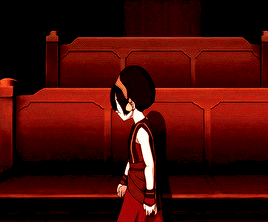
An extremely awkward moment they went out of the way to include.
Before we dive in, let’s take a step back and establish our priorities here. I’m not going to use this post to make claims about secret Zutara subtext, or even argue the merits of Zutara as a ship, really. Conversely, to the extent that I critique Kataang, it’s going to focus strictly on writing choices and leave aside the question of whether Aang and Katara are romantically suited for each other as characters or not. For the purposes of this post, we will take as granted that Kataang was the intended endgame pairing from the beginning, and romantic Zutara was never intended at all, and look at how the showrunners went about handling that.
(under a cut because woah this got long)
The Ember Island Players is an entire episode built around the show parodying itself and its fandom. In such an episode, it would be almost impossible to avoid at least alluding to the ship wars, which for those of you not part of the fandom back then, were absolutely massive. (And encouraged by the show’s promotion - but that’s another story.) Whatever Bryke’s intentions, the Zutara phenomenon had grown so influential that Zuko was perceived by fans as Aang’s main rival for Katara’s affections - in spite of never being presented as such in the show. That’s begging for a joke or two, isn’t it?
So before the parody play even starts, we get the moment in the gif above, a joke which is painfully dragged out by Aang shyly pointing out that he wanted to sit next to Katara, and Zuko’s utter obliviousness as to why. (Katara herself shows no reaction to any of this fumbling - perhaps unintentionally foreshadowing some of the problems to come.) Aang relents, and sits on the other side of Zuko.
In practical terms, there are two things that justify this gag beyond a bit of awkward humor. The first is that subsequent moments in the episode where the characters comment on the play involve both Katara and Zuko interacting with each other, and Zuko and Aang interacting with each other, making it most effective for Zuko to be seated between Katara and Aang for blocking purposes.
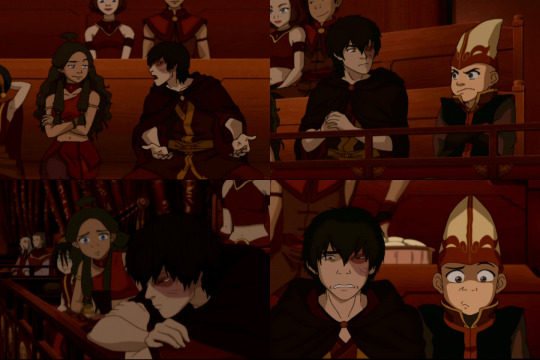
Aang and Katara don’t interact much during the play. More unintentional foreshadowing? You be the judge.
The other reason is that this moment of making a fuss over seating arrangements sets up early on what is actually going to be a significant theme addressed in the episode - the question of whether Zuko is going to figuratively come between Aang and Katara the way he literally does here. And make no mistake, the episode is very concerned with this question.
After a brief spoof of Jetara that gets only a mild reaction of embarrassment from Katara, the first time the play-within-the-show really dives into shipping is its sendup of ridiculous Zutara expectations of the crystal cave scene in The Crossroads of Destiny. Actress!Katara declares the Avatar to be like a little brother, professes her attraction to actor!Zuko, and the two embrace. This is, of course, absurd for these characters at this point in the story, but to be fair, it’s a pretty accurate rendition of the wildest Zutara fandom predictions for the episode. The silliest of enemies-to-lovers tropes have always had their place in Zutara fandom. Capture!fic was very much a thing. Haha, it’s good for us all to laugh at ourselves sometimes.
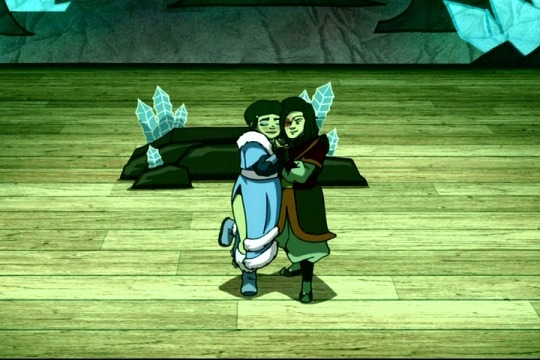
Pictured: Artist’s reconstruction of Zutara fan fic c. December 1, 2006
Aang, however, is not laughing. After growing increasingly frustrated with his own portrayal in the play, this scene makes him so angry that he storms out of the theater. It’s clear that, to Aang, this is no joking matter - and that means it’s quickly going to become more serious for the audience as well, as we soon move into what might be the episode’s most controversial scene, and certainly the one that has the largest dramatic impact on the actual narrative of the show. The tone of this scene is a stark contrast to the majority of the light-hearted, self-referential, tongue-in-cheek episode.
When Katara goes to find Aang, he confronts her about what her actress counterpart said, and we finally, after fifty-six episodes, get a scene where Aang and Katara directly talk about their relationship. This is a big moment, not just because it’s a weighty scene in the middle of a fluff episode, but also because it’s a huge opportunity to push forward the relationship that, remember, we’re accepting as intended endgame all along. The writers know Aang and Katara are going to end up together. They’ve known it for years. After playing coy about Katara’s feelings for nearly three full seasons, they must have been dying to get to this moment.
This isn’t a shy kiss-or-die scenario. (Let it never be said that Zutara has the monopoly on silly tropes.) This isn’t a heat of the moment, one-sided pre-battle kiss that will be ignored later because of more pressing concerns. This is the chance for these characters to have a frank conversation about where they stand and what the nature of their relationship should be.

Spoiler Alert: It doesn’t go well.
Obviously we can’t have any actual Kataang resolution in this episode - we have to save that for the finale. Fair enough. So what do we do instead? We muddy the waters a bit more, make things even more complicated to resolve in the four episodes we have left, after giving this relationship little to no serious development in the previous fifty-six episodes.
Katara dismisses what her actress counterpart said in the play, but admits she’s confused about her own feelings. When Aang tries to kiss her again, she’s upset by it and storms away. This is the first and last time we ever see Katara address the possibility of her romantic feelings for Aang, until they kiss in the final seconds of the very last episode, her confusion apparently resolved off-screen.
Zuko isn’t mentioned in this scene, but from the perspective of showrunners trying to set up Kataang and unexpectedly confronting a popular rival ship they never intended, in the context of the previous scenes discussed above, this having Katara be dismissive of the play’s portrayal of her also seems like a pretty clear dismissal of Zutara. In fact, arguably this scene is a better casual dismissal of Zutara than it is a setup of the last-minute Kataang endgame.
And then, when the gaang returns to the theater for the final act of the play with the seating arrangements now reshuffled, we get one last awkward reaction shot of Aang and Katara when their stage counterparts declare their platonic affection for each other. And look who’s also in the frame for some reason.

Since they’ve all left the theater and come back, Zuko doesn’t need to be sitting next to Katara at this point.
So the overall effect of the “shipping” subplot of this episode comes across as the writers assuring us that Zutara is silly, and that in spite of fandom expectations Zuko is not a romantic rival for Aang, while at the same time maintaining enough ambiguity between Katara and Aang so as not to preempt the resolution of them getting together in the finale.
What’s bizarre about it is...they didn’t actually have to do any of that? Within the world of the show, nobody had ever raised the possibility of Zuko and Katara being romantically involved prior to this episode. If it was never going to happen, it wasn’t something that needed to be addressed. Instead of taking this opportunity to give us reasons why Katara is going to get together with Aang - perhaps the review of their past adventures helps her clarify some of her own feelings, while still leaving her reservations about the timing? - this subplot seems more interested in trying to tell us that she’s not going to get together with Zuko.
This is writing to the fandom, rather than writing to the narrative. From a storytelling perspective, it’s a waste of time. If the Zuko/Katara/Aang triangle is just a product of silly fans and doesn’t actually exist in the show, then there’s no need to make such a big deal of it. Rather than a throwaway gag, the seating shenanigans and dramatic weight given to Aang’s insecurities make the on-stage Zutara romance a central feature of the episode. There was no reason this had to be the case.
So why was it?
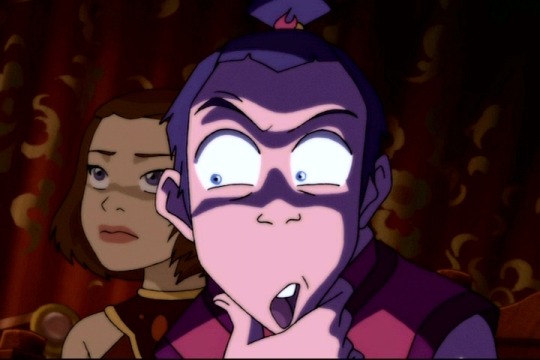
Welcome to the realm of speculation.
One possibillity is that the writers of this episode (or Bryke themselves, directing them) simply got carried away with spoofing the fandom and lost sight of the actual narrative work they should have been doing. This is a case of bad priorities and poor judgement, but it’s fairly innocent.
The other possibility, and the less innocent one, is that it was deliberate shipbaiting. The shipping subplot seems meant to dismiss the possibility of Zutara in hindsight, working under the assumption that Kataang was always intended and Zutara never was - but it obviously wasn’t read that way by Zutara fandom at the time. With Zuko and Katara’s dramatic reconciliation in The Southern Raiders coming immediately prior to this episode, now the question of romantic Zutara is introduced and Katara’s feelings for Aang are less clear than Kataang shippers had assumed? Sounds pretty promising for Zutara when you look at it that way.
Was this actually intentional? As mentioned earlier, promotional material for the show did outright encourage the idea of the love triangle, even though the show itself hadn’t before. If the idea of this subplot wasn’t explicitly to give Zutara shippers false hope and set them up for disappointment, it may yet have been the last effort to throw kerosene on the fire of the ship wars before the show’s finale.
It’s hard to believe that fan reactions wouldn’t have been considered when writing such a metatextual episode that engaged with the fandom so directly, but I do hate to assign malice as a motive where incompetence is a suitable explanation, so let’s assume that if this was the case, Bryke thought it was all in good fun. It still reflects poor judgement and priorities, because egging on drama among your fans shouldn’t be more important than developing the narrative you’re actually trying to tell.
So whatever the reasoning, in this episode, on the eve of the show’s finale, it seems that dissing Zutara was more important than developing Kataang.
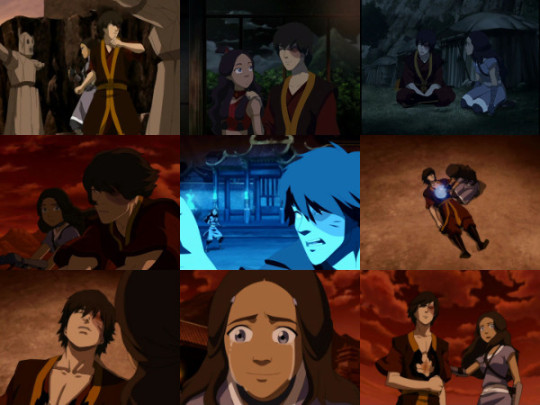
YMMV on whether this is better or worse than the finale itself, where developing Zutara was more important than developing Kataang.
#zutara#go to bed catie#anti kataang#thoughts about movies and things#atla meta#historical critical zutara fandom studies
2K notes
·
View notes
Note
(based on your previous ask) do you mind if I ask how you feel about lok? is there a general consensus if it's good or bad? youre really insightful and just wanted to know if there were any major issues you had with it
yeah sure, i’ll do my best. if you want a quick answer to your question, here is a link to some of my other korra posts where i say pretty much the same thing as i do here, just in fewer words. cause this post will be mostly an unhappy summary of my experience watching the show. this post will contain spoilers, and disclaimer, i am a really biased, disappointed asshole, so i’ll just admit that now.
short answer: i liked the concept of lok more than the product we got. a lot of that is because you had a physically buff brown wlw protagonist written mostly by cishet white men and, as you can imagine, it wasn’t handled great. when i think of lok now i tend to fluctuate between bittersweet nostalgia and quiet, simmering rage.
if you don’t care about the show summary, skip at the middle paragraph break down to my tldr.
so for those who don’t know, LOK was really my first “big” fandom on tumblr. when it was announced, a bunch of ATLA purists were already hating on it because 1) brown woman, 2) it was unrealistic to go from ATLA’s technology to streampunk in 70 years, and 3) it wasn’t ATLA, basically. it was my first big interest that i got to participate in as it was airing, and i was really excited about it. i defended it, i wrote meta, i liveblogged, i wrote tons of fic and spammed theories/wants before the damn show even had a release date. all that is to say, i was Invested, and i believed in it before i even saw it. people called me a bnf, i’m not sure if that’s true, but i did gain a lot my followers in my first few years on tumblr by posting korra stuff. a lot of them – hello – i think are still around today (i’m not certain how all the video games hasn’t scared them off yet)
i should say at this point that my opinion of LOK the show has been really wrapped up in the ugly stain left by the fanbase. korra the character has been the subject of tons of racist, misogynistic criticism since the moment we saw her back; when she showed up on screen as a proud young woman who fought with authority and stood up for herself, that was the nail in the coffin for her reputation. i agreed that she had a bit of growing up to do, because ATLA/LOK have always been stories about coming of age and maturing, but i disagreed strongly with this notion that she deserved to be “humbled,” which is what a lot of fans were looking for.
the overall consensus on if it’s “good” depends on who you ask. most people agree that ATLA is better overall: it was better plotted because it benefited from more writers in the room and more episodes to flesh out the world. opinions on LOK specifically range based a lot on their opinions of the K/orra/sami pairing, if they were involved in or what side they were on in any of the fandom wank, and also just complete random chance.
i’ll go more in depth into my ‘history’ with the show below, but i just wanted to mention that all the while the show was airing, korra was being hit with waves of criticism by so-called fans for basically being a confident brown woman who were calling for her to learn her place, respect her elders, etc. another common theme was fandom’s brilliant fucking idea that asami, a light-skinned feminine non-bending woman who was more polite and reserved than korra, would’ve made a better avatar. because you know why. (korra was often described as brutal, rough, unsophisticated, next to pretty, perfect asami. and asami is a fine character, to be clear, but that’s what she was – fine. nothing really stands out about her, which is a fault of the writing, because she had a lot of potential too.) so anyway all of this did sour my mood toward engaging with other fans outside my friend circle.
–
it was around maybe the middle of book 1 that i realized the writing for the show was simpler than what i was expecting – not that it was childish, which it was (because it was written for children, i understood that), but i felt like the plot meandered and the twists came out of nowhere. it felt like they were making it up as they were going, and it opened threads it didn’t answer. one of the biggest threads was the equalist revolution, which was a very sensitive topic that got jettisoned when the leader was revealed to be a fraud, and that devalued the entire movement in an instant. really disappointing, because i was looking forward to seeing that addressed. for a lot of people, this was a dealbreaker, and they started walking. i stuck with it, but loosely.
book 2 aired, focusing on the spiritual world and some really cool history. it still suffered a lot from awkward b-plots and loose threads it didn’t know how to tackle. korra lost her memory and then regained it 2 episodes later with no consequences, mako flip-flopped between korra and asami because bryke don’t know how to write teenage romances without making it a love triangle, and at some point bolin kissed a girl against her will and they didnt acknowledge that at all? i honestly don’t remember. anyway at the end of book 2, even though korra saves the day and prevents the world from descending into darkness for ten thousand years, due to events beyond her control, korra loses the spiritual connection that ties her to all of the previous avatars – aang, roku, kyoshi, wan, everyone. and people hit the fucking ceiling. “korra’s not a real avatar if she lost her connection to the old ones! that’s the entire point of the cycle! this show is bullshit, it’s not canon anymore!” (the entire point that finale demonstrated that korra’s power alone was enough to save the world and she didn’t need anyone else. but people found that ~unrealistic~ i guess). as you can imagine, being a fan of LOK is starting to get a little tiring by now.
books 3-4 is where the korra haters got to love the show again, because they were both straight-up torture porn. after everything she did saving the world, this is the arc where korra got beat down, tortured, dragged into the dirt, swallowed and spat back out. book 3 is a lot of people’s favorites because it was the first book that felt fully plotted out before it was put on air, which is why i enjoyed it too. but for me it was difficult to see a girl, whose identity revolved around being the avatar after being raised and sheltered to think it was all she was good for, effectively abandon her life and even her name by the beginning of book 4 because the events of book 3 were that traumatizing for her. somehow this was character development. we were encouraged to stick with it because we hoped korra would find herself again. and she did, sorta.
but it makes me furious that people who had quit in books 1-2 came back during 3 because they heard these books were better – aka book 3, the book that featured korra the least, and books 3-4 in which korra got her ass handed to her in some of the hardest fights vs some of the cruelest villains of the series. (nevermind that the book 3 villains suffer from the anime villain curse: they quickly went from “cool character design” to “wait, how does this rando group of villains show up with powers literally no one in the universe has ever heard before?” – questions no one ever answers)
anyway book 4 is a mish-mash of… i’m not sure. i’ve rewatched all the books but i don’t know if i’ll ever touch this one again. the culturally appropriating airbender wannabe, zaheer (a complete rando who somehow masters airbending enough to fly, which was a huge middle finger to airbending masters aang and tenzin for no reason) a guy who literally tortured korra one season before and put her in a wheelchair, is the one who the writers send korra to for her spiritual awakening that lets her save the day. not tenzin or jinora, her spiritual teachers with whom she has positive, healthy relationships – they send her back to her abuser who terrifies and degrades her a bit more before deciding to help. this was a pattern: the writers made both korra and asami face their abusers (in asami’s case, her father) for catharsis instead of gaining peace over their trauma another, healthier way because…. i’m not sure why. there is no reason why. and then there’s the guilt tripping nonsense of asami feeling as if she had to forgive her father, who tried to kill her, because he said he was sorry and sacrificed himself for her in the finale. it’s angst galore, if you like that kind of thing, which i normally do, except this is less angst and more just the writers trying to hammer in torture porn, grimdark, and poor attempts at morally gray nonsense into their finale season.
anyway at the end of her journey, korra, our buff brown woc, learns that she had to suffer to learn how to be compassionate and relate to her enemy. i’m not exaggerating, she literally says that. which is lovely.
–
tldr: i wasted a lot of emotional time and energy into this show and was extremely disappointed when some of the ending’s notes were “you had to suffer to become a better person” and “forgive your abusers/villains because aren’t we all the same in the end?”
but also on a strictly narrative level, LOK also bit off way more than it could chew both emotionally and thematically. it had an amazing premise, but it was not committed to
utilizing the steampunk genre to its best potential in the bending world (after the creativity in the rest of the worldbuilding, the LOK series finale was literally fighting a giant robot – seriously?)
giving its hero the respect and character arc she deserved. and i don’t say that because i think korra had no growing up to do in b1, she did, but she didn’t deserve for it to happen like that.
so basically i realized that a lot of the writers that made ATLA great weren’t brought back for LOK, and it showed. i realized that the LOK writers, when they listened to fans, were listening to the fans that whined the loudest, or (more likely, since they plan seasons years before we see them) they thought from the beginning that it was a good idea for korra to go through years’ worth of pain just to be spat out a humbler, “better” person
the reason i told you all that about me defending LOK in the beginning is because i need you to understand that i believed in LOK longer than i probably should’ve. i wanted it to be everything i was expecting in a diverse children’s show with an unorthodox female protaganist. but just because they had a brown wlw heroine doesn’t mean that they deserved to be praised for it when they treated her like garbage.
and korra and asami walk into a beam of light together in the last second of the show and i’m supposed to applaud the writers for their bravery or something
#megan talks about korra#Anonymous#askbox#this is a very condensed summary because otherwise i'd be here all day talking about the pro-asami anti-korra fandom wank
50 notes
·
View notes
Text
Definitive Ranking of Book 4 Episodes, #1/13
1. 4x02 Korra Alone
Non-linear all around perfect episode that explores Korra’s struggles with PTSD and I can’t even be funny about this. Oh and Toph.
This is a post that’s taken me some time to write, because addressing the perfection of this particular episode is a daunting task. I mean it. It’s not just the best episode of Book 4, it’s the best episode of the franchise. The most daring as well.
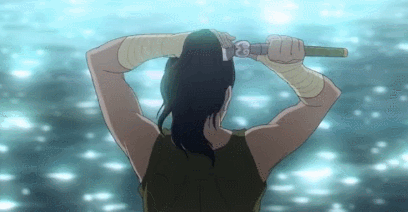
For a little bit of context, there’s an incredibly popular episode from Avatar: the Last Airbender called “Zuko Alone.” It picks up after he leaves Iroh in “Avatar Day,” because his uncle kind of pointed out that the hunt for the Avatar might be a tad on the futile side. His brain can’t reconcile this, so the episode instead shows him trying to blindly stick to this task, while feeling as though he has no place in the world, and being rejected by anyone who finds out who he really is. He struggles with inner darkness, inner pain, and the whole time his story is punctuated by flashbacks of his relationship to his sister, his mother’s disappearance, and his father’s ascension to Fire Lord.
I’m not sure I’d call it the high point of ATLA (“Crossroads of Destiny” gets that honor), but it is kind of everything with regards to Zuko, easily one of the strongest characters Bryke have ever written. Also it did a great job of not endorsing his self-destructive tendencies or making excuses for him.
“Korra Alone” was announced (and screened) at the 2014 New York Comic Con, and when Bryke first said the episode title, the audience screamed. Smugly, from the comfort of my couch, I shook my head at the livestream and declared that there was no way this could measure up.
Well, color me dead wrong. I forgot that it was starring Korra, and she not only measures up, she creates a new goddamned reality the world didn’t know it needed.
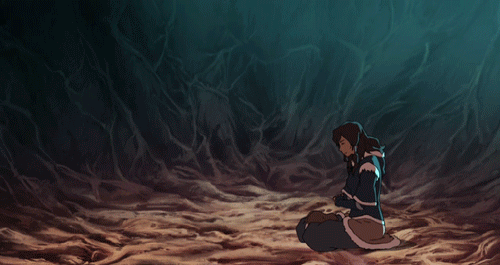
Just thinking about the episode for first-time viewers, it does exactly what it needs to do. It’s impactful coming off the [mostly] Korra-less “After All These Years” to not just see her, but feel what she’s going through and feel that isolation, even when she’s surrounded by her parents and other loved ones. Though it somewhat takes on the travel+flashbacks format of “Zuko Alone,” even Korra’s present-day plot isn’t strictly sequential—most notably with us learning the real reason she entered the earthbending cage-match, with the flashes moving faster to get her to the swamp. It gives the entire episode a very ungrounded feel, which for the viewer does two things:
You desperately begin to want Korra to connect and be stabilized, because there is an inherent discomfort from the loose form for your brain (not a bad thing...an effective discomfort)
It REALLY gives the impression that time is passing in this episode
The second point is especially striking when you consider the scope. We’ve got in one “plotline” (for lack of a better term): Korra underground fighting, following a ‘dog’, and getting sucked into the swamp where she meets Toph. This alone covers significant ground. Then we have her flashbacks of leaving Republic City, not improving in her home and Senna begging her to go to Katara, Katara’s first healing session, the letters from friends that paint time as passing, Katara’s ‘wiggle your toe’ session, Tenzin visiting, Korra’s narrated letter to Asami while she meditates and trains, her leaving the SWT, her failing to apprehend the thieves, turning from Yue Bay, cutting her hair and donning new clothes, the tree of time scene, then traversing every possible landscape.
HOW WAS THIS ALL IN A 22 MINUTE EPISODE?

Yeah. This is three years, no question about it. It’s visually stunning, but there’s also this extreme sense of loss that the viewer is clued into, and the aimlessness that is heavily felt. Korra’s physical appearance changing was the external manifestation of this, and the symbolism surrounding it was as clear as when Iroh and Zuko did the same nearly 8 years prior. Toph popping out at the end is the one bit of relief, and it *really* shines, especially given her voice actor being perfect and sounding instantly familiar to us (did Philece Sampler just watch hours and hours of Jessie Flower footage or something??).
I can’t see this not landing for someone the first time through, to be perfectly honest. It sets up Korra’s journey for the season, and with her still out of touch from Raava and still away from friends and family, there’s a lot that needs resolving, and that the audience should definitely want to see resolved.
Placing “Korra Alone” in the context of the entire season, and the series at that (or even the franchise) is a different ballgame. Not a worse one, but it certainly means that you can consider this in Korra’s healing arc as a whole.
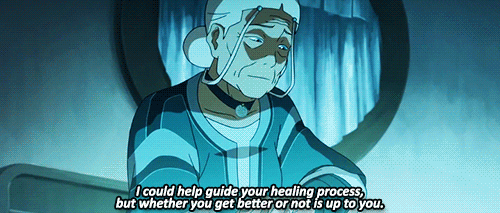
I’ll fully admit I was not 100% on-board with Dark!Korra being the representation for PTSD at first, even though this is, at the end of the day, a Y7 show that needs to break down these concepts to children. However, it worked within this episode, and given how the whole thing was resolved through mindful meditation (plus how the little bit of metal Korra extracted didn’t end up being a cure-all), I think it justified itself in a general sense.
In the case of “Korra Alone” alone (lol), it worked in a sort of 3rd person omniscient way, to quickly convey Korra reliving this moment and having a ton of anxiety each time it occurred. What had the potential for being a bit of a cheap visual metaphor instead mostly landed, giving us a kind of visceral understanding of that anxiety (and as someone who’s had to explain what that feels like to people who’ve never experienced it, that’s really no easy task).
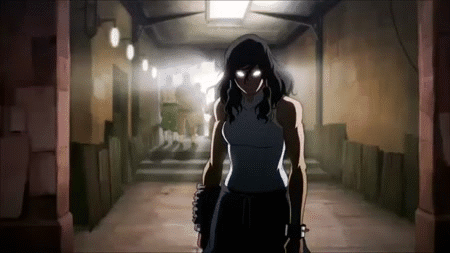
When it comes to Korra’s healing arc as a whole, I’m going to have to be an asshole and tell you that Gretchen ( @theonewithpurplehair ) and I are planning on writing something about it when she gets back from South Africa. It will be lengthy and emotional and talk about THEMES and how important this is. We do that.
But even in advance of it, I think there’s a point to be made about Bryke choosing to have a healing arc in the first place. They didn’t have to, you know. And for some, especially in light of the indelicately worded “I needed to suffer” quote from the final episode, having two white men use a bisexual indigenous woman to explore a story about recovering from extensive trauma is uncomfortable, which is absolutely a valid tension.
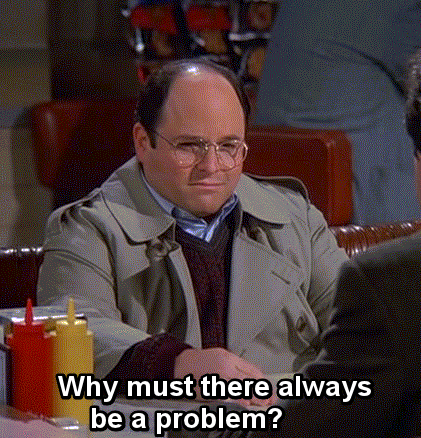
However, something I think @glamourweaver highlighted best back when fandom dialogue was more...heightened, was that like it or not, Korra’s gone through major traumas throughout the show. In Book 1, she lost most of her bending and was so affected there was not-subtle-at-all suicide imagery included. Then Aang’s magic touch fixed her depression! Yay!
In Book 2, she had Raava ripped out of her and lost her (admittedly newfound) connection to her past lives, calling into question her very identity as the Avatar. The whole astral-projection thing she did? That was just Korra’s strength of soul, separate from anything to do with reincarnated powers. So yeah, reconnecting with Raava and becoming the first Avatar of a new spiritual age would totally be healing, but the idea that there’s no trauma she’d need to explore? Book 3 is near and dear to me, but in many ways it almost feels like a new show, complete with not bothering to tap into implications of the first 2 seasons. Whoops!
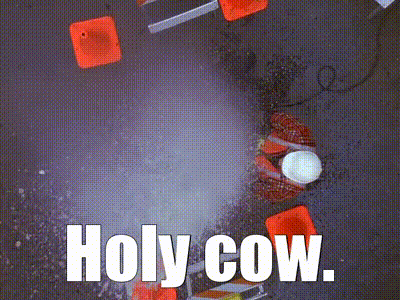
It’s yeah, not great how much she was put through the wringer when you get down to it. But Bryke are conscientious and tend to fix their mistakes. In a lot of ways, Korra being given PTSD—like...realistic PTSD—and an ensuing healing arc in Book 4 was the direct answer to everything previously glossed over.
The result? To that, I’ll just go ahead and quote @beccatoria’s essay (seriously, read it), because it lays out the meaning so well:
“This brings us to the final part of my argument: forming new meanings. The therapies I have mentioned so far focus on the physiological issues. The brain blows a fuse and can't process what it has experienced, so if you fix the fuse, you fix the processing problem. This still leaves a person who has been through an extremely traumatic event. PTSD almost always presents alongside issues such as depression and can lead to feelings of isolation and guilt. Individuals may either feel emotionally disconnected or emotionally out of control and have often internalised damaging messages as a result of their trauma. There is often a focus on creating new meanings as these memories are re-examined. We see this in Korra's evolving attitude to her own experiences.
Zaheer asserts that her power is limitless. She should never have been able to survive the poison. He offers her an opportunity to recontextualise her survival as evidence of her enormous resilience and strength rather than as a failure because she did not survive unscathed. While she is recovering, Katara tells her about Aang and how he chose to find meaning in his suffering. “What will I find?” Korra wonders. “Won't it be interesting to find out?” Katara asks. The answer comes in her final conversation with Tenzin. Korra chooses to form new meanings for her experiences, and chooses to find a message of compassion and empathy.”
Yes, the landing was not 100% perfect, but the recontextualization of her suffering and subsequent empowerment through that was clear. Korra ended the series hopeful about the future, and more at peace than we had seen her—certainly more at peace than that flailing teenager who was more willing to demand a duel with Amon than admit fear. She had grown and found ways to reconcile what happened into how she wanted to lead her life.

Do you mind if I get personal for three seconds? I have general anxiety, as well as a very specific (and admittedly mild) trauma associated with driving, and though I’ll never equate my experience to Korra’s brutalization (seriously, mine just involves a hangover, a large cup of coffee, pizza, and a bridge), there is something about that terror of being out-of-control I identify with, and it features so strongly in Korra’s arc. I also know what it’s like to want to will something away and fight against everything that’s happening. Why can’t my stupid brain just STOP?
But the thing is, like beccatoria said, it’s about contextualizing it. Anxiety never goes away, and it certainly can’t be willed out of the forefront. But you can choose to look at things with a new point of view. To be able to sit with a feeling and recognize what it is, even if it’s massively uncomfortable or puts your body in flight-or-fright mode. Personally, I’ve come to look at my anxiety/intrusive thoughts as a very badly behaved cat. The cat is weirdly trying to protect me, and truly thinks this is what will help keep me safe, but well...it’s an idiot:
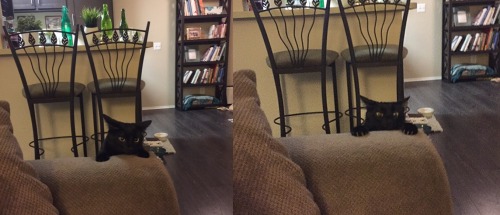
Still, it’s *my* idiot, damnit, and now when I drive, I can just picture her in the passenger seat chewing on the emergency brake. She’s also the survival mechanism my brain came up with to shield me from more chaotic forces in my life, and that’s kind of neato, when you get down to it.

*Kind of*, okay? (I still need to replace this chair, though Trystane Nymeros has done more damage to it with his many toes).
The point is, Korra’s story is powerful and salubrious because she just...goes through hell and back, she really does. But she not only finds meaning in it, she finds positivity and hope. She is at her MOST secure when she flings herself in front of that spirit gun, and then talks down the season antagonist with a few words. It’s uplifting, without pulling *any* punches on how ugly and terrifying and isolating PTSD can be.
There were punches thrown outside of “Korra Alone” too, but that was the episode that waded in most deeply, and somehow did it in an appropriate fashion for a Y7 show. I can’t sing its praises enough, truly.

Having laid this all out, it seems almost trite to mention the Korrasami aspects of the episode. It didn’t escape the fandom that Korra telling Tonraq and Senna she wanted to go back home read like a coming out conversation, and the “Dear Asami” sequence is without question the most stunning of the episode. Though @queertoonqueertoons lays out why there’s other reasons for that as well. But like, what can be said? Korra lets herself be vulnerable around Asami in a way she won’t with others, and Asami asks for very little in return. It was a nice, continuing thread, but it never became a focal point of the episode, or the series, so shame on me if I buck the trend.
I can give overall thoughts on Book 4 when I pull together the final post for this ranking, but like Korra, I think I’m ending on a pensive and positive note. “Korra Alone” will do that for you, even though it may be the darkest episode of the franchise. What a masterpiece.
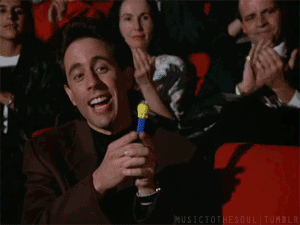
#13: 4x08 “Remembrances”
#12: 4x11 “Kuvira’s Gambit”
#11: 4x09 “Beyond the Wilds”
#10: 4x07 “Reunion”
#9: 4x06 The “Battle of Zaofu”
#8. 4x12 “Day of Colossus”
#7 4x01 “After All These Years”
#6 4x03 “The Coronation”
#5 4x04 “The Calling”
#4 4x05 “Enemy at the Gates”
#3 4x10 “Operation Beifong”
#2 4x13 “The Last Stand”
Book 2 ranking/essays found here
173 notes
·
View notes
Text
Some Thoughts About Amon
All the would have beens and could have beens...
While I do like the Amon/Noatak thing (because it plays into the equalism = communism theme and applies some interesting historical reference/commentary), I know that not everyone likes it. I have some friends who think that the Amon = Noatak idea was bad idea, and I think that’s fair. That particular reveal needed way more build up. So, I’d like to share some of the alternate ideas that I’ve heard tossed around.
Amon should have been actually been scarred and his story should have been true. I believe that many feel that Amon’s fake scars and backstory discredited the equalist movement (I disagree with this assessment). Some people were deeply invested in Amon’s character and had built up some very lovely headcanons about his history and relationships. It’s easy to see how a lot of Legend of Korra fans felt betrayed by the ‘twist’ at the end. I think it would have been pretty cool if Amon’s scars and backstory had been true. But I also think that if they were going to do this, they had to make a point of differentiating Amon from Zuko. And that means we’d have needed to see more of his character in action, maybe get some quality interaction between Korra and Amon... Otherwise his character would feel repetitive and recycled. But if they’d pulled it off, it would have been great.
Amon should have been Koh. This could have been very cool. Koh was one of the most frightening adversaries in The Last Airbender. He was terrifying, powerful, and left an impression. His presence would have provided a nice set up well for later plots with the spirits and let the audience get a better feel for the dangers of the spirit world. But... I’m not sure if Korra could have handled Koh. Season 1 Korra barely had any patience or fortitude. She’d just stepped out into the world for the first time ever (This is Miss. Walks-Up-To-A-Food-Stall-Without-Yuans, after all). She wasn’t written to handle a major threat gracefully or maturely, she was written to barrel through things with all the grace of a bull in a china shop. Frankly, I suspect that if Koh had shown up and Korra had been ‘our’ Korra, Koh would have won. In short, Korra’s character would require an overhaul, because a battle with Koh requires an experienced and worldly Avatar. Season 1 Korra had no experience. She’d only just started making friends... Also... Amon would have needed way more build up and “creep factor.” Sure, Amon was scary, but I think the audience needed face-stealing centipede scary instead of angry revolutionary scary. And the show would have needed more spirits from the start. But this would have set up nicely for the spirit-world arc...
Amon should have been Mako and Bolin’s fire-scarred father. This last one belongs to my beta-half who does proof-reading for the fic, so we’ve had several conversations about this idea. They hold that it would have been really interesting if Amon’s real backstory had been Mako and Bolin’s backstory. Remember that in the show, we’re introduced to the fact that Mako and Bolin’s parents were attacked by a fire bender and struck down. We never actually see the flashback, we only hear Mako’s account of events. A tragic and terrible event would have been confusing for a young child. And there’s no guarantee that the authorities would have done the appropriate follow-up (keep in mind the Republic City prisons have a revolving door...) for the kids or any survivors of the attack. So, my dear beta thinks it would have been an awesome reveal if it turned out that Amon was really Mako and Bolin’s firebender (for this canon) fire-scarred dad, who believed his entire family died during the attack. And I have to admit that beta has a point. It would have melded Mako’s story into the main plot, been a huge angst bomb, and played into Bryke’s beloved ‘daddy’ tropes very nicely... But, once again, this would have needed more build up. We’d need to see evidence that Mako and Bolin’s father might have survived the attack. We’d need to get an account of the assault. We’d need more angst and less anger from Amon...
I think no matter how you carve it, Amon’s character needed more screen time and development prior to the big reveal. More hints, more story beats, more little reveals and hints to prepare us for the truth bomb...
3 notes
·
View notes